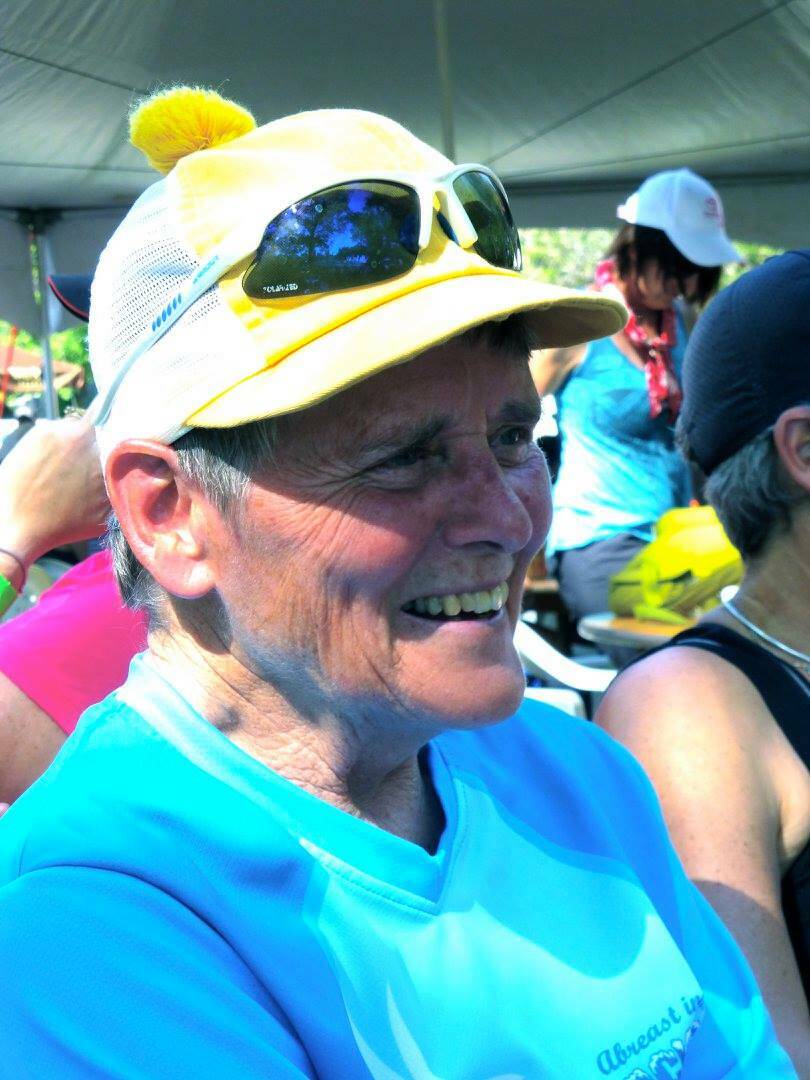If not for yearly mammograms, Cranbrook resident Sue Selby would have faced a much more challenging battle with cancer.
Selby, who was accustomed to regular breast cancer screening, was first diagnosed with the disease in 2002. A small node was detected on her left breast during a mammogram at East Kootenay Regional Hospital. The cancer was in an early stage of development and she did not have symptoms at the time or even a lump on her chest.
“Usually it was fairly routine. The ‘yup, that’s fine. Go away,’” she recalled.
“This time it was ‘oh yep, we need another picture.’”
Selby, then age 64, began the treatment process. She opted for a mastectomy over radiation and underwent a round of chemotherapy. She suffered some side effects from the chemotherapy, but since the cancer was caught early, she healed quickly.
She lived cancer-free for almost a decade, but in 2011 it returned. A mammogram found a node in her right breast. Once again, the disease was caught early when she did not have any symptoms.
“It was sort of like little spots, like grains of sand,” she recalled as she described looking at the x-ray images.
She drove with her daughter to Tom Baker Cancer Centre in Calgary for a final diagnosis and upon her return to Cranbrook, was visited by a cancer specialist from Kelowna.
She underwent a second mastectomy and once again, made a full recovery. Since the cancer was caught early both times, she struggled far less than most women.
“Most of the women who have had breast cancer have had a more difficult time with it … I wasn’t sick either time. I just went in and had surgery and got over it.”
She uses her experiences to emphasize the importance that regular cancer screening plays in early detection, particularly for her daughters and granddaughters.
“I think if there’s a family history, it’s worthwhile to have a mammogram when you’re younger to make sure everything’s ok.”
Selby represents the one in every eight Canadian women that develop breast cancer in her lifetime. She is also part of a widening demographic of survivors, whose cancer is detected earlier thanks to improved screening methods.
According to the Canadian Cancer Society, cancer mortality dropped 37 per cent in men and 22 per cent in women between 1988 and 2021.
Yet cancer still remains the leading cause of mortality in Canada as per CCS statistics — responsible for 28.2 per cent of national deaths.
CCS also stated that breast cancer accounted for one quarter of new cancer cases in Canadian women and 14 per cent of female deaths last year.
From a young age, Selby was keenly aware of the devastation cancer could cause.
In the 1950s, her father was diagnosed with an unusual form of cancer located around the major blood vessels of his heart and in the area behind his sternum. He passed away a week short of his 39th birthday.
“It didn’t show up on the x-ray and when they eventually opened him up, their techniques were not advanced enough to do anything about it,” she recalled. “He did have radiation, but he ended up with serious burns from it. He went from being a big man to next to nothing in about 18 months.”
“It never occurred to me when he was sick that he was going to die … We all have to go sometime, but that was too young.”
In the years since his passing, many more members of Selby’s family have battled the disease.
Her sister and cousin are breast cancer survivors and her two brothers successfully fought prostate cancer and non-Hodgkin lymphoma. Her mother died of bladder cancer
“There’s some kind of genetic weakness somewhere that allows cancer to get started in my family,” she remarked.
One of Selby’s good friends died of a brain tumor when he was a young man and this motivated her to start a career in the hospice care industry, where she could support others who were dealing with serious illness.
“Our kids had been really close to him and my husband and I were close to him and his wife. My son, particularly, was really impacted by that,” she said.
Despite lifelong hardships with cancer, she continues to maintain a positive outlook.
“Cancer doesn’t dominate my life. I don’t spend a lot of time thinking about it and I don’t worry about whether I might get something. I’m 84 years old now.”
She has been a member of the Abreast In The Rockies Dragon Boat Team since 2006, a group made up of breast cancer survivors and supporters who have witnessed friends and family fight the disease.
From June to September, the team travels to other communities to compete in paddling tournaments. Dragon boating was traditionally a Chinese sport, but in 1996, sports medicine specialist Donald Chisholm McKenzie started a Canadian movement for breast cancer survivors, believing that the strenuous exercise and socially supportive atmosphere of the sport would be beneficial in recovery.
Selby said the team provides survivors with a great sense of community.
“If there hasn’t been any cancer in your family or in people that you know, then it still is that fearful thing. Younger women with breast cancer tend to have a tougher time.”
“It’s an amazing group of women.”
@gfrans15
gillian.francis@cranbrooktownsman.com
Like us on Facebook and follow us on Twitter.

